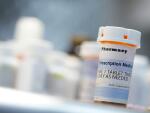
If you’re unable to achieve or maintain an erection firm enough to have sex, you could have erectile dysfunction (ED). But just because ED occurs in the bedroom doesn’t mean the problem should remain behind closed doors. In some cases, ED can signal more serious health conditions, so it’s important to discuss any sexual problems with your doctor.
There can be a variety of ED causes. They come down to nerve supply and blood flow. Any injury, illness or issue that impairs your nerves or affects blood flow to your penis can cause ED. What could those problems be? Here are four possible causes of ED.
The majority of ED cases are due to medical issues including:
Atherosclerosis—or hardening of your arteries
Diabetes
Heart disease
High blood pressure
Obstructive sleep apnea
Prostate cancer treatment
To get an erection, you need adequate blood flow to the penis. These conditions are known to damage your blood vessels, which can impair blood flow and cause ED.
The good news is that addressing underlying health conditions could help improve ED. In addition to discussing medical treatments, ask your doctor what you can do to improve your vascular and overall health. For example, lifestyle changes can reduce the risk of high blood pressure, diabetes, and heart disease—as well as improve symptoms of ED. Talk with your doctor about how to make these changes, such as quitting smoking, losing weight, and increasing your physical activity.
Prostate or bladder surgery for cancer could potentially harm nerves and arteries located near the penis and cause ED. Research shows that oral medications, injectable medications, and vacuum devices can improve ED due to surgery. Oral medicines for ED include sildenafil (Viagra), tadalafil (Cialis), and vardenafil (Levitra); alprostadil (Caverject) is an injectable medicine. Vacuum devices work by drawing blood into the penis to create an erection. Ask your doctor if these treatments are right for you.
Could the cause of ED be in your medicine cabinet? Maybe. Eight of the 12 most commonly prescribed medications list ED as a side effect. ED can be a side effect of many other common medications. These include:
Antidepressants
Antihistamines
Appetite suppressants
Blood pressure drugs
If you’re taking a medication and experience ED, talk with your doctor, but don’t stop taking the medication. Suddenly stopping some medicines can be dangerous. Your doctor needs to determine whether the medicine is a problem or not. If so, your doctor may decrease your dose or change your medication to one that may be less likely to cause ED.
Your mind plays an important role in your sexual function. Stress, anxiety and depression can lead to ED. Talk with your doctor about what’s going on in your life and any mental issues you may be experiencing. If anxiety associated with intercourse is causing ED, a psychotherapist or other mental health provider can work with you and your partner to build intimacy and decrease anxiety. Learning to effectively manage stress can also help. And if you are suffering from depression, your doctor can guide you to appropriate treatment.



